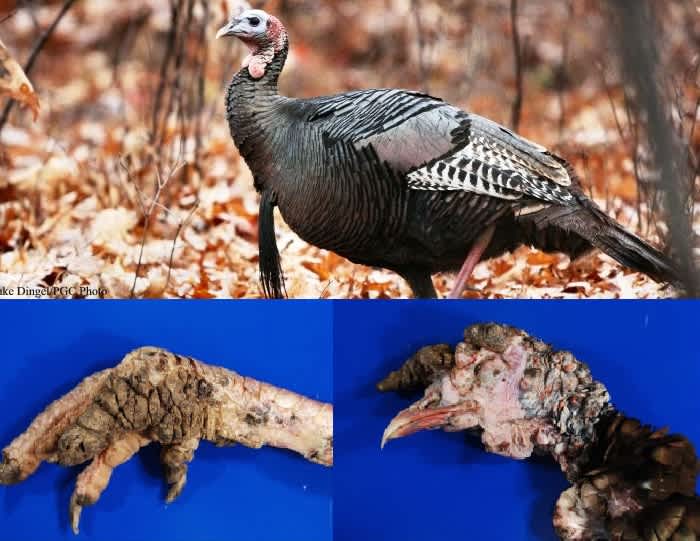Study: Gruesome Tumor-causing Turkey Virus Now in 17 States
OutdoorHub Reporters 02.12.15

A potentially deadly virus once only found in European domestic turkeys has found its way to North America, and according to a recent study by researchers at the University of Georgia, is much more widespread than previously thought.
Scientists with the Southeast Cooperative Wildlife Disease Study said that wild turkeys in 17 states from Maine to Colorado have tested positive for lymphoproliferative disease virus (LPDV), which can cause tumors and wart-like growths on the heard and neck area. However, researchers also stated that they had determined the virus was much less dangerous than it was originally believed to be.
“Once we discovered this virus and found it was common, there was a big scare,” Justin Brown, lead researcher on the study, told the Associated Press. “There was a fear that this virus was decimating turkeys and we’ve missed it all these years.”
The disease was once thought to be rapidly fatal to a high rate of turkeys infected, as researchers generally only found dead turkeys with signs of the virus. Thanks to hunters, who submitted seemingly-healthy turkeys for testing, scientists found that while infection is common, the appearance of tumors is not. In fact, fatality from the virus is now considered to be a relatively rare event, although researchers are still unsure exactly what percentage of turkeys infected will exhibit more severe symptoms.
According to wildlife officials, the virus can cause cancerous tumors in the spleen and liver, as well as more visible signs such as scabby nodules on the skin of the legs and head area. Affected turkeys can also be disoriented, weak, and lethargic, making them easier prey for predators. The virus is not transmissible to humans.
“LPDV is a fairly new virus for the United States,” stated New Hampshire Fish and Game on its website. “The first case was reported in the U.S. in 2009, and it is now present in New England.”
Relatively little is yet known about the virus and how it affects wild birds. Previously, it was only found in domestic turkeys in Europe and Israel. So far seven states have reported dead turkeys from the disease, including Arkansas, Georgia, New Jersey, New York, North Carolina, Pennsylvania, and West Virginia. Other states have confirmed infected birds, but reported no fatalities—and for researchers concerned that the virus was a major problem, it comes as a big relief. Still, scientists said there is more to learn from the disease, such as how it affects younger birds.
“One of the things we need to do moving forward is to try to determine if there are other effects of this virus other than tumors,” Brown said.

